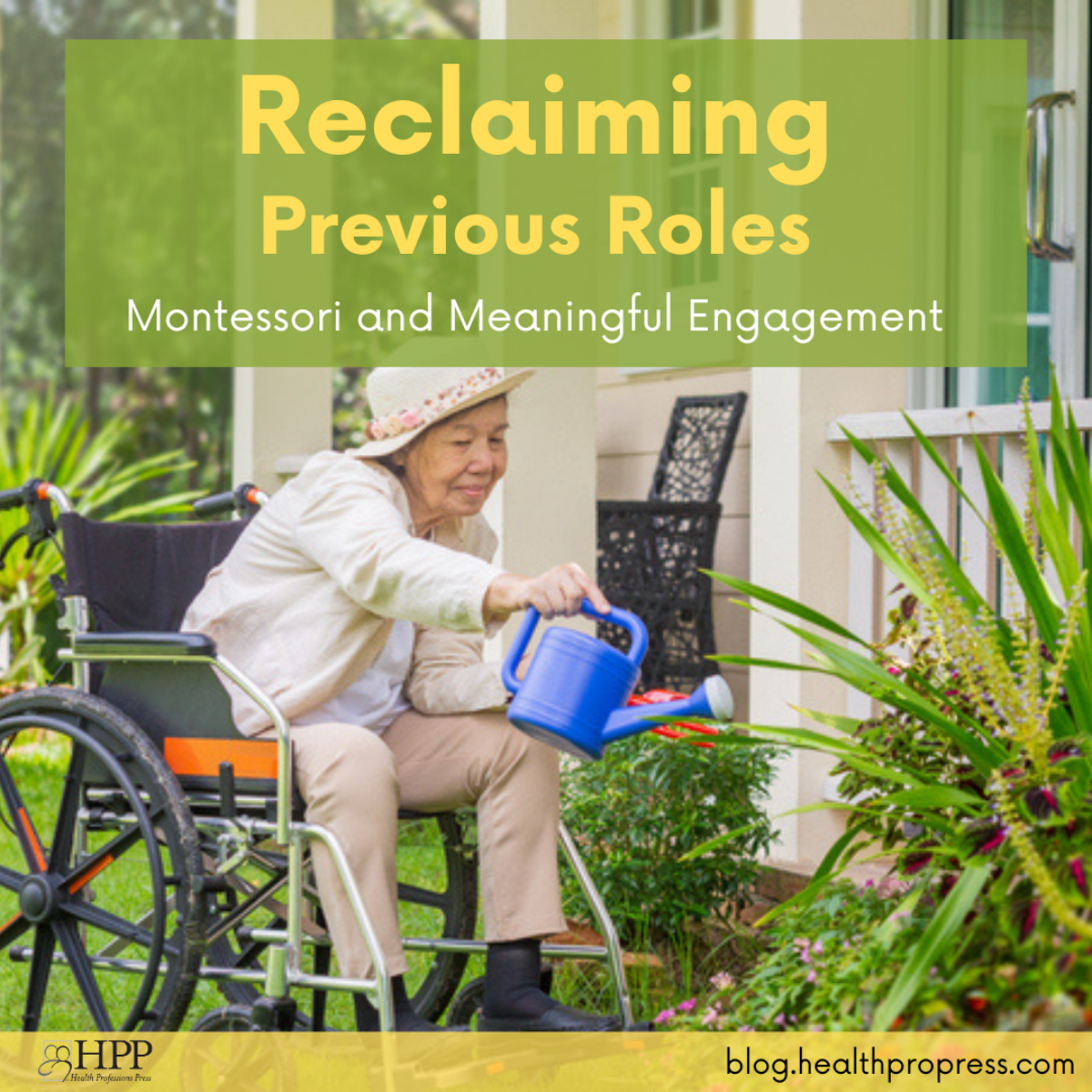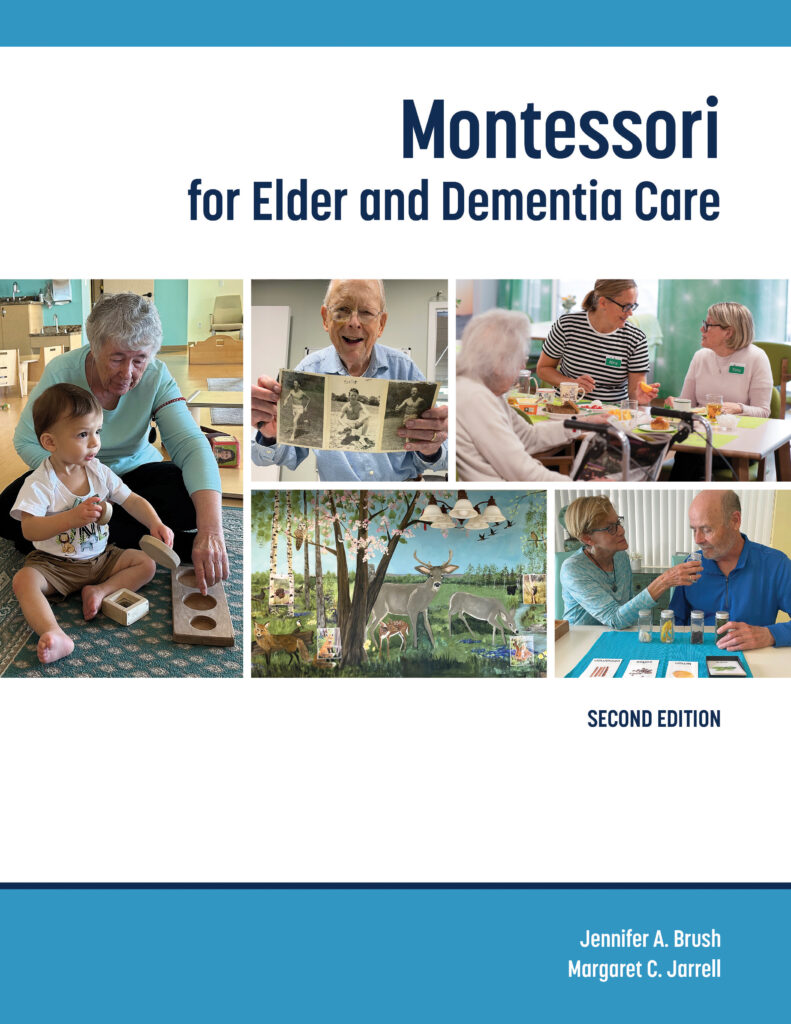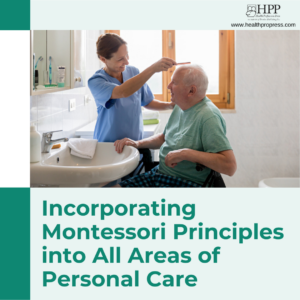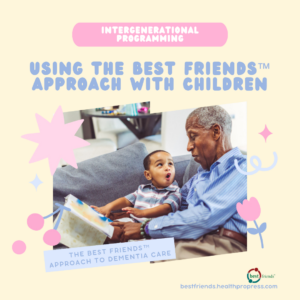
Montessori and Meaningful Engagement: Reclaiming Previous Roles
An elder or person with dementia still has the same needs as everyone else. The person wants to socialize, express desires, participate in hobbies, interact with family, be included in activities, teach and learn, and be asked for advice. The person has the same desires to contribute to the household or the community. The need to have purpose in one’s life and to be productive does not end once someone reaches a certain age, moves into a long-term care community, or receives a diagnosis of dementia.
Think of all the roles you have in your everyday life. You are a parent, child, sister, brother, friend. You are an employee, volunteer, cook, cleaner, driver, and so much more. Now think of the roles that remain for elders in many long-term care communities. The list is much, much shorter. Yet we all need a reason to get out of bed in the morning! This is where Montessori comes in.
Montessori is a way of life. Purposeful and satisfying activities and roles happen as a normal course of the day on one’s own or in small groups. The Montessori philosophy is not a technique, task, or intervention. It’s a way of living one’s life to the fullest extent possible.
Montessori roles and activities allow elders to maintain previous roles and take on new ones that contribute to the life of the household in meaningful ways.
Roles and activities give elders an opportunity to:
Care for the environment
Care for the environment by cleaning, washing, dusting, tidying, serving, folding, weeding, raking, planting, and so forth, just as they did in the past. When individuals decorate their spaces with meaningful and beautiful items such as family photos, flowers, or their own handicrafts, they create a sense of belonging to the environment that contributes to their well-being. When engaging in and retaining previous roles, individuals enhance self-esteem and increase independence and self-reliance.
Care for themselves
Care for themselves within the family or community. Individuals have an opportunity to help others who may not be able to complete a task on their own due to cognitive, physical, or sensory impairment. For example, one person may read to another who has vision impairment. When living or spending the day with others, one cares for others and develops meaningful relations that contribute to well-being.
Be hospitable
Be hospitable and participate in social interactions. Entertaining guests, pouring tea for a friend, and holding celebrations are all opportunities to maintain important life roles. We need to create frequent opportunities for elders to be hospitable. It is important to celebrate a variety of occasions, especially if there is cultural diversity in the care community. Encourage older adults to use their skills and celebrate occasions through poetry, painting, literature, music, crafts, and/or food.
Sometimes elders will initiate the activities. At other times, staff or family will need to invite or encourage individuals or help the individual to create a new routine that involves the role or activities. For example, a person who enjoyed setting the table for her family previously may enjoy setting the table at the care community. However, the person may not remember to come to the dining room prior to the meal to set the table. Staff may have to invite the person—“Would you like to set the table with me today?”—and help the person regain the daily habit or routine. The person might then later respond to a buzzer or timer in her room, a schedule in her room, or music played each day at the same time to encourage her to head for the dining room to set the table. Over time, the activity will be familiar, and the person will take to the activity spontaneously.

For more on bringing Montessori to your community and creating individualized assessments and meaningful engagement plans for the elders you serve, get your copy of Montessori for Elder and Dementia Care, Second Edition. You’ll find everything needed to begin and sustain the Montessori philosophy with elders or people living with dementia, including a full step-by-step action plan, forms and assessments, and ready-to-use activities!
This post was excerpted from Montessori for Elder and Dementia Care, Second Edition by Jennifer Brush, M.A., SLP, and Margaret C. Jarrell, M.Ed. Copyright © 2024 by Jennifer A. Brush. All rights reserved.





Add comment